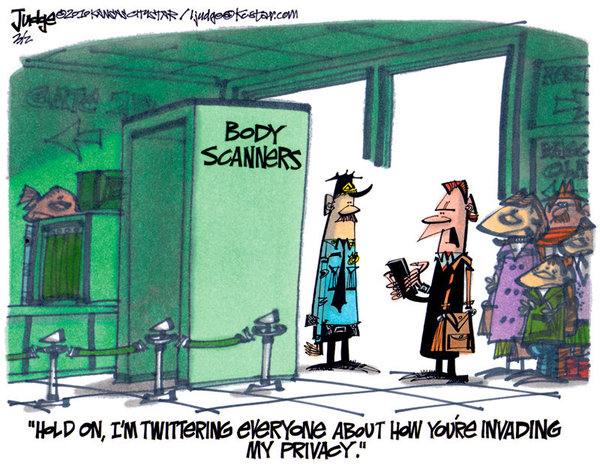U.S. air travelers have lodged complaints over use of full-body security scanners in the past year, charging they violate personal privacy and may be harmful to their health, documents released on Tuesday showed.
The complaints ranged from concern about genitals being seen and the use of the devices on children, to anger over passengers not being told they could request a pat-down search instead and potential health worries from the scans.
“I was not given an option to use the whole body screening device. Neither was anyone else. It appeared that everyone was being required to go through the devices, even children,” said one complaint from an unidentified traveler who flew through the Tulsa airport in May 2009.
The TSA downplayed the complaints, saying only 600 of more than 4 million air travelers had lodged objections — an “infinitesimally small” 0.015 percent — and stressing that passengers could opt for an alternative form of screening.
Homeland Security Secretary Janet Napolitano said on MSNBC that the level of radiation from the scanners was not like that emitted from hospital equipment, rather was “quite de minimis”, and that the technology has improved to ensure privacy.
“With respect to, you know, some of the privacy issues, I think a lot of those involved the first iteration of the technology, but the technology already has changed so much that as we install these in airports, passengers overwhelmingly prefer them to the magnetometer,” she said.
Polling shows most air travelers — nearly 80 percent — approve of the use of advanced imaging technology to screen airline passengers.
Complaints about the scanners flooded in after the failed bombing attempt in December. The surge may have been a part of a call-in campaign as many were received by the TSA’s call center on January 15.
TSA and the Department of Homeland Security have defended the use of the machines, saying that the images are not stored and screeners examining the images are in a separate location and cannot see the passenger.
TSA plans to have about 450 full-body scanners deployed by the end of the year. Some of the machines use 40 millimeter wave technology and others use backscatter, low-level X-rays, though officials have said the health effects were minimal.
